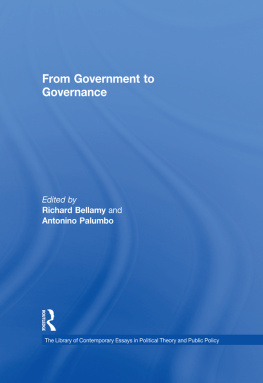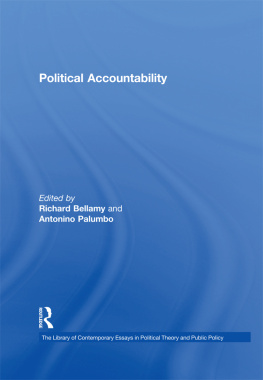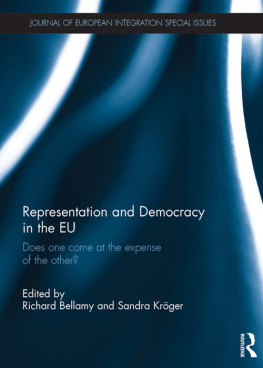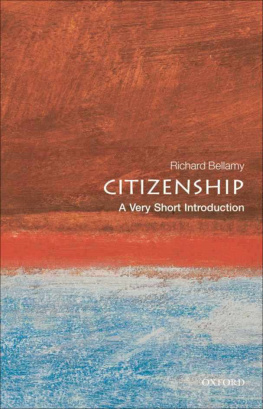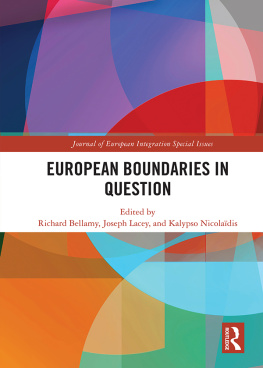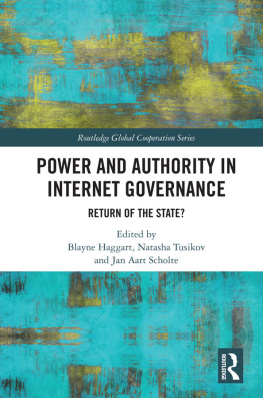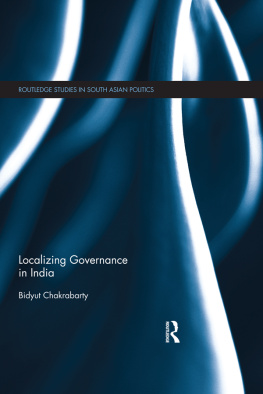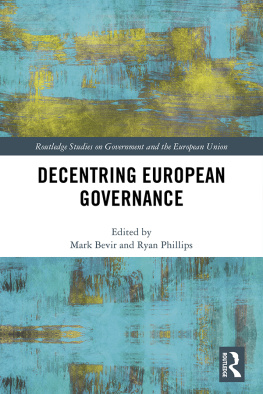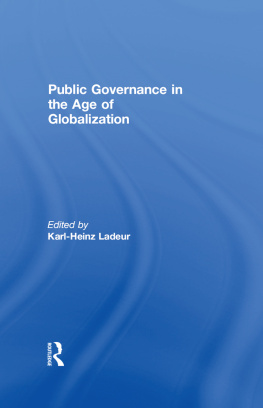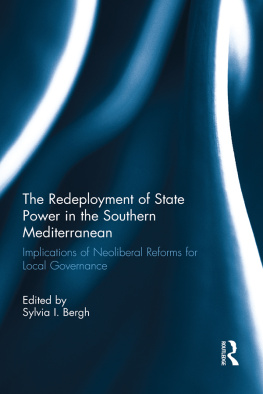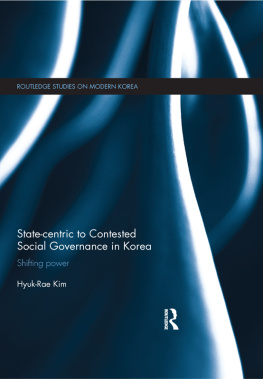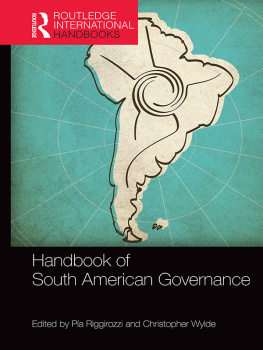First published 2010 by Ashgate Publishing
Published 2016 by Routledge
2 Park Square, Milton Park, Abingdon, Oxon 0X14 4RN
711 Third Avenue, New York, NY 10017, USA
Routledge is an imprint of the Taylor & Francis Group, an informa business
Copyright 2010 Richard Bellamy and Antonino Palumbo. For copyright of individual articles please refer to the Acknowledgements.
Wherever possible, these reprints are made from a copy of the original printing, but these can themselves be of very variable quality. Whilst the publisher has made every effort to ensure the quality of the reprint, some variability may inevitably remain.
All rights reserved. No part of this book may be reprinted or reproduced or utilised in any form or by any electronic, mechanical, or other means, now known or hereafter invented, including photocopying and recording, or in any information storage or retrieval system, without permission in writing from the publishers.
Notice:
Product or corporate names may be trademarks or registered trademarks, and are used only for identification and explanation without intent to infringe.
British Library Cataloguing in Publication Data
From government to governance. (Library of contemporary
essays in political theory and public policy)
1. State, The. 2. Public admistration. 3. Separation of
powers.
I. Series II. Bellamy, Richard (Richard Paul) III. Palumbo,
Antonino.
321-dc22
Library of Congress Control Number: 2009934254
ISBN 9780754628033 (hbk)
The editor and publishers wish to thank the following for permission to use copyright material.
Cambridge University Press for the essay: Giandomenico Majone (1997), From the Positive to the Regulatory State: Causes and Consequences of Changes in the Mode of Governance, Journal of Public Policy, , pp. 13967. Copyright 1997 Cambridge University Press.
Co-Action Publishing for the essay: Saskia Sassen (2008), Neither Global nor National: Novel Assemblages of Territory, Authority and Rights, Ethics and Global Politics , , pp. 6179. Copyright 2008 S. Sassen.
Lynne Rienner Publishers, Inc. for the essay: James N. Rosenau (1995), Governance in the Twenty-First Century, Global Governance , , pp. 1343.
Sage Publications for the essays: Andrew Dunsire (1996), Tipping the Balance: Autopoiesis and Governance, Administration and Society , , pp. 299334. Copyright 1996 Sage Publications, Inc.; Fritz W. Scharpf (1994), Games Real Actors Could Play: Positive and Negative Coordination in Embedded Negotiations, Journal of Theoretical Politics , , pp. 2753. Copyright 1994 Sage Publications.
Taylor & Francis for the essays: Jan Kooiman and Martijn van Vliet (2000), Self-Governance as a Mode of Societal Governance, Public Management Review , , pp. 35977. Copyright 2000 Taylor & Francis Ltd; Christian Joerges and Jrgen Neyer (1997), Transforming Strategic Interaction into Deliberative Problem-Solving: European Comitology in the Foodstuffs Sector, Journal of European Public Policy, , pp. 60925; Philippe Pochet (2006), The Open Method of Co-ordination, Perspectives on European Politics and Society , 7, pp. 7590. Copyright 2006 Routledge; Stijn Smismans (2008), New Modes of Governance and the Participatory Myth, West European Politics , , pp. 87495. Copyright 2008 Taylor & Francis (http://www.informaworld.com); Adam Harmes (2006), Neoliberalism and Multilevel Governance, Review of International Political Economy , , pp. 72519.
University of Michigan Law School for the essay: Anne-Marie Slaughter (2003), Global Government Networks, Global Information Agencies, and Disaggregated Democracy, Michigan Journal of International Law , , pp. 104175.
Wiley-Blackwell for the essays: R.A.W. Rhodes (1996), The New Governance: Governing without Government, Political Studies , , pp. 65267. Copyright 1996. Published with permission of Blackwell Publishing Ltd; Mark Bevir (2006), Democratic Governance: Systems and Radical Perspective, Public Administration Review, , pp. 42636; Chris Ansell (2000), The Networked Polity: Regional Development in Western Europe, Governance, , pp. 30333. Copyright 2000 Blackwell Publishers; Bob Jessop (1998), The Rise of Governance and the Risks of Failure: The Case of Economic Development, International Social Science Journal , , pp. 2915. Copyright 1998 UNESCO; Gary Marks, Liesbet Hooghe and Kermit Blank (1996), European Integration since the 1980s: State-Centric v. Multi-Level Governance, Journal of Common Market Studies, , pp. 34178. Copyright 1996 Blackwell Publishers Ltd; Joshua Cohen and Charles Sabel (1997), Directly-Deliberative Polyarchy, European Law Journal , , pp. 31312. Copyright 1997 Blackwell Publishers; Reiner Eichenberger and Bruno S. Frey (2002), Democratic Governance for a Globalized World, Kyklos , , pp. 26587; John S. Dryzek (1999), Transnational Democracy, Journal of Political Philosophy , , pp. 3051. Copyright 1999 Blackwell Publishers Ltd.
Every effort has been made to trace all the copyright holders, but if any have been inadvertently overlooked the publishers will be pleased to make the necessary arrangement at the first opportunity.
The normative appraisal of public policy both the process of policy-making and the substance of the policies themselves is becoming ever more salient for politicians, public officials, citizens and the academics who study them. On the one hand, the wider population is better informed than ever before about the activities of those that govern them and the consequences of their decisions. As societies have become more wealthy, so the expectations of citizens have grown and with it their tendency to criticise those who work on their behalf. On the other hand, though committed to the ideal of democracy, these same citizens have become ever more disillusioned with its actual working as a means for holding politicians and bureaucrats to account. In part, that disillusionment reflects the shift from government to governance both within and beyond the state, which has weakened or dispersed in complex ways the responsibility of politicians for many key areas of public policy. In part, it also reflects the desire for citizens for more individually tailored and particularistic forms of accountability that address their specific concerns rather than those of the collective welfare. As a result, a whole new machinery for standard setting and monitoring political behaviour has developed. The purpose of this series is to explore and assess the normative implications of this development, appraising the efficacy and legitimacy of the procedures and mechanisms used, and the outcomes they aim to achieve.
These issues lie at the heart of many of the most exciting new areas of research and teaching in moral and political philosophy, politics, international relations and public administration, and law and jurisprudence. The essays chosen reflect this disciplinary mix and the interdisciplinary work that has arisen in this area as a result. The volumes will be suitable for Masters and Professional courses in public policy, political theory and international relations; jurisprudence, international and public law; and applied ethics and political philosophy; as well as a useful resource for scholars doing research or those teaching in these areas.

